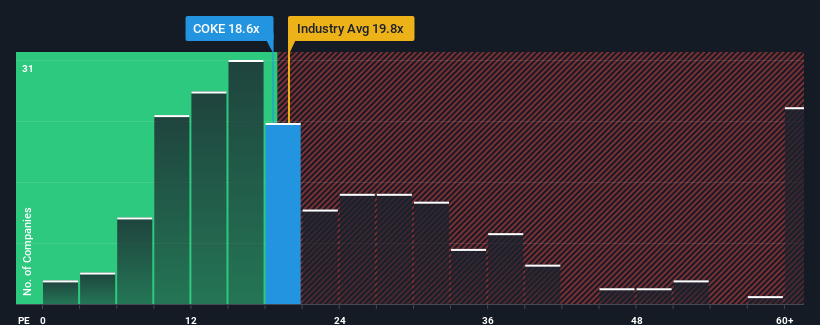- United States
- /
- Beverage
- /
- NasdaqGS:COKE
With Coca-Cola Consolidated, Inc. (NASDAQ:COKE) It Looks Like You'll Get What You Pay For
Coca-Cola Consolidated, Inc.'s (NASDAQ:COKE) price-to-earnings (or "P/E") ratio of 18.6x might make it look like a sell right now compared to the market in the United States, where around half of the companies have P/E ratios below 16x and even P/E's below 8x are quite common. Although, it's not wise to just take the P/E at face value as there may be an explanation why it's as high as it is.
Coca-Cola Consolidated certainly has been doing a great job lately as it's been growing earnings at a really rapid pace. The P/E is probably high because investors think this strong earnings growth will be enough to outperform the broader market in the near future. You'd really hope so, otherwise you're paying a pretty hefty price for no particular reason.
Check out our latest analysis for Coca-Cola Consolidated

How Is Coca-Cola Consolidated's Growth Trending?
There's an inherent assumption that a company should outperform the market for P/E ratios like Coca-Cola Consolidated's to be considered reasonable.
If we review the last year of earnings growth, the company posted a terrific increase of 37%. The strong recent performance means it was also able to grow EPS by 370% in total over the last three years. Accordingly, shareholders would have probably welcomed those medium-term rates of earnings growth.
Comparing that to the market, which is only predicted to deliver 10% growth in the next 12 months, the company's momentum is stronger based on recent medium-term annualised earnings results.
With this information, we can see why Coca-Cola Consolidated is trading at such a high P/E compared to the market. Presumably shareholders aren't keen to offload something they believe will continue to outmanoeuvre the bourse.
What We Can Learn From Coca-Cola Consolidated's P/E?
Typically, we'd caution against reading too much into price-to-earnings ratios when settling on investment decisions, though it can reveal plenty about what other market participants think about the company.
We've established that Coca-Cola Consolidated maintains its high P/E on the strength of its recent three-year growth being higher than the wider market forecast, as expected. At this stage investors feel the potential for a deterioration in earnings isn't great enough to justify a lower P/E ratio. If recent medium-term earnings trends continue, it's hard to see the share price falling strongly in the near future under these circumstances.
Having said that, be aware Coca-Cola Consolidated is showing 1 warning sign in our investment analysis, you should know about.
If you're unsure about the strength of Coca-Cola Consolidated's business, why not explore our interactive list of stocks with solid business fundamentals for some other companies you may have missed.
New: AI Stock Screener & Alerts
Our new AI Stock Screener scans the market every day to uncover opportunities.
• Dividend Powerhouses (3%+ Yield)
• Undervalued Small Caps with Insider Buying
• High growth Tech and AI Companies
Or build your own from over 50 metrics.
Have feedback on this article? Concerned about the content? Get in touch with us directly. Alternatively, email editorial-team (at) simplywallst.com.
This article by Simply Wall St is general in nature. We provide commentary based on historical data and analyst forecasts only using an unbiased methodology and our articles are not intended to be financial advice. It does not constitute a recommendation to buy or sell any stock, and does not take account of your objectives, or your financial situation. We aim to bring you long-term focused analysis driven by fundamental data. Note that our analysis may not factor in the latest price-sensitive company announcements or qualitative material. Simply Wall St has no position in any stocks mentioned.
About NasdaqGS:COKE
Coca-Cola Consolidated
Manufactures, markets, and distributes nonalcoholic beverages primarily products of The Coca-Cola Company in the United States.
Flawless balance sheet with proven track record.
Similar Companies
Market Insights
Community Narratives




